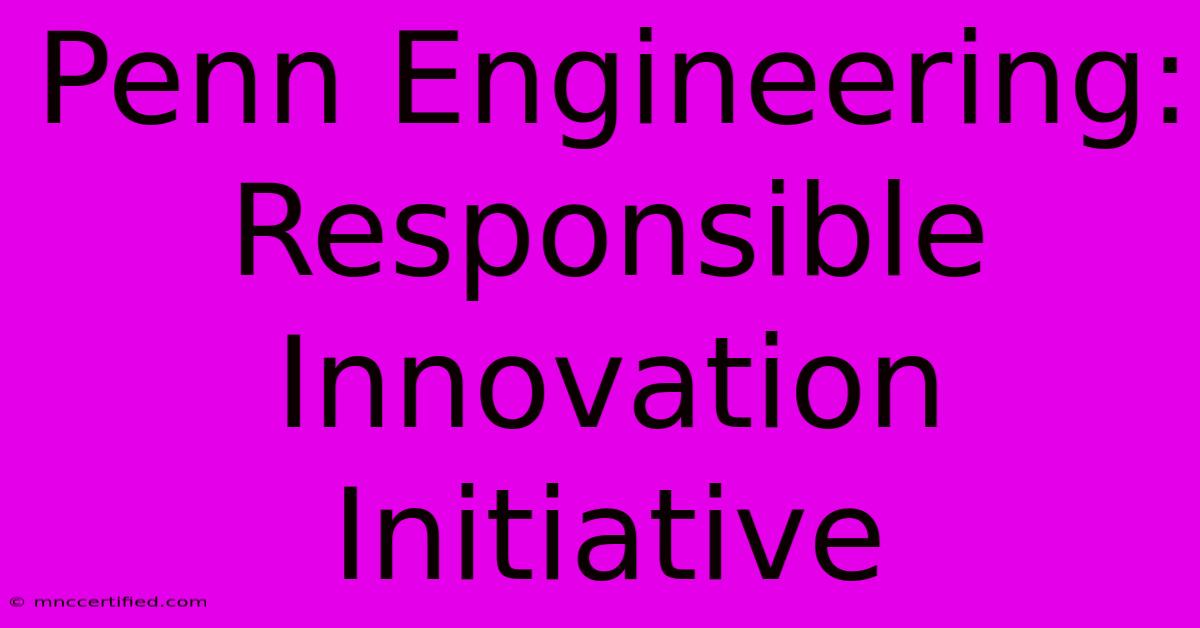Penn Engineering: Responsible Innovation Initiative

Table of Contents
Penn Engineering: Responsible Innovation Initiative – Shaping a Better Future Through Technology
The University of Pennsylvania's School of Engineering and Applied Science (Penn Engineering) is renowned for its cutting-edge research and groundbreaking innovations. But Penn Engineering goes beyond technological advancement; it deeply embraces a commitment to responsible innovation. This commitment is embodied in its Responsible Innovation Initiative (RII), a multifaceted program designed to ensure that technological progress serves humanity and the planet ethically and sustainably.
Understanding Penn Engineering's Responsible Innovation Initiative
The RII isn't just a buzzword; it's a framework integrated into the very fabric of Penn Engineering's curriculum, research, and outreach. It aims to equip students and researchers with the critical thinking skills and ethical frameworks needed to navigate the complex challenges posed by rapidly evolving technologies. This involves:
1. Integrating Ethics into Education:
Penn Engineering proactively incorporates ethics and societal impact into its engineering education. This isn't a separate course; it's interwoven into existing curricula, encouraging students to consider the broader implications of their work from the outset. Courses often include case studies, discussions, and projects that explore the ethical dilemmas inherent in technological development. This approach fosters a culture of responsibility from the very beginning of a student's engineering journey.
2. Fostering Ethical Research Practices:
The RII extends beyond the classroom, influencing research projects across all disciplines within Penn Engineering. Researchers are encouraged to consider the potential societal impacts – both positive and negative – of their work. This might involve conducting thorough risk assessments, engaging with stakeholders, and actively seeking diverse perspectives to mitigate potential biases and unintended consequences. The initiative promotes a culture of transparency and accountability in research.
3. Engaging with the Broader Community:
The RII recognizes the importance of dialogue and collaboration with external stakeholders. Penn Engineering actively engages with policymakers, industry leaders, and community members to discuss the ethical implications of new technologies. This open communication helps ensure that technological advancements align with societal needs and values. Workshops, conferences, and public forums provide platforms for these crucial conversations.
4. Promoting Sustainable Development:
Sustainability is a central pillar of the RII. Penn Engineering recognizes the urgent need to address climate change and environmental challenges. The initiative encourages research and innovation focused on developing sustainable technologies and practices, promoting environmental stewardship and responsible resource management.
Keywords Driving the Initiative's Success:
The success of the Penn Engineering Responsible Innovation Initiative is built upon a foundation of keywords that effectively communicate its goals and impact. These include:
- Responsible Innovation: This core phrase emphasizes the initiative's central focus.
- Ethical Engineering: This highlights the integration of ethics into the engineering process.
- Sustainable Technology: This underscores the initiative's commitment to environmental responsibility.
- Societal Impact: This focuses on the initiative's goal to address real-world problems.
- Penn Engineering: This anchors the initiative within the institution's brand and reputation.
The Future of Responsible Innovation at Penn Engineering
The Penn Engineering Responsible Innovation Initiative is a dynamic and evolving program. It continuously adapts to the changing technological landscape and societal needs. By fostering a culture of responsible innovation, Penn Engineering is not only shaping the future of technology but also contributing to a more equitable and sustainable world. It serves as a model for other engineering schools and institutions around the globe, demonstrating the crucial role that ethical considerations play in technological advancement.
Off-Page SEO Strategies:
To further enhance the online visibility of this article, consider these off-page SEO strategies:
- Guest blogging: Contribute articles related to responsible innovation and Penn Engineering to relevant websites and blogs.
- Social media promotion: Share the article across relevant social media platforms, tagging Penn Engineering's official accounts.
- Backlink building: Seek backlinks from reputable websites and blogs in the fields of engineering, ethics, and sustainability.
- Community engagement: Participate in online forums and discussions related to responsible innovation and Penn Engineering.
By implementing both on-page and off-page SEO strategies, this article can effectively reach a wider audience and contribute to a stronger online presence for the Penn Engineering Responsible Innovation Initiative.

Thank you for visiting our website wich cover about Penn Engineering: Responsible Innovation Initiative. We hope the information provided has been useful to you. Feel free to contact us if you have any questions or need further assistance. See you next time and dont miss to bookmark.
Featured Posts
-
Steelers Browns Game Live Updates And Tv
Nov 22, 2024
-
Captain Tom Charity Daughters Role
Nov 22, 2024
-
Snowflake Reports Strong Q3 Revenue Positive Turnaround
Nov 22, 2024
-
Farm Bureau Insurance Atlanta Tx
Nov 22, 2024
-
2025 Qb Lewis Jackson State Bound
Nov 22, 2024